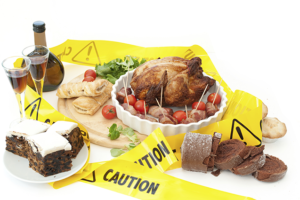No bath for the Christmas turkey – food safety tips for the holiday period
Media release: 18 December 2015
While Santa might be real, the Food Safety Information Council says there are a lot of food safety Christmas myths out there including the need to wash the turkey before cooking it.
According to Rachelle Williams, Council Chair, 68% of people in the Council’s most recent national survey washed their turkey before cooking it.
‘Turkey is an important part of our Christmas tradition and still popular, with half of the people surveyed reported cooking a whole turkey, but it can be a source of food poisoning if not handled correctly.
‘The last thing your turkey needs is a bath before being cooked as cooking the turkey correctly to 75 °C in its thickest part is the best way to kill any bacteria present. Washing the raw turkey, or any other poultry, can spread food poisoning bacteria around your kitchen where it can contaminate your sink area and other food, utensils and your hands.
‘It is disappointing to see many Christmas recipes and chefs still recommending washing poultry and advising that poultry is cooked when the juices run clear – the only safe way to ensure it is the correct temperature of 75 °C is to use a meat thermometer.
‘The Council is a health promotion charity and, as we gather with family and friends this Christmas, we are encouraging people to make a donation in lieu of a gift with one of our easily downloadable Christmas gift cards,’ Ms Williams concluded.
Here are 5 other food safety myths busted to keep your family and friends food safe during the holidays:
- No one goes hungry at a family celebration – don’t over cater and buy too much food that won’t fit in your fridge and leave you with too many leftovers.
- The fridge isn’t just for beer – make room in your fridge for perishable food by putting drinks on ice, this also means the fridge won’t constantly be opened by your guests.
- Christmas ham won’t last forever – check the storage instructions and best before or use by date before removing the ham from its plastic wrap, cover it with clean cloth soaked in water and vinegar so it doesn’t dry out, and store it in the fridge below 5°C. Reduced salt hams are now becoming popular but will not last as long as conventional hams so think how much you are going to use in the next week or so and freeze some for later.
- Leaving food out in the sun for hours isn’t on – don’t leave dips and other perishable foods like patés, cold meats, poultry and salads out for more than two hours, put out small amounts and replace from the fridge.
- Leftovers should be cooled to room temperature before refrigerating – with the Christmas leftovers its important not to leave them unrefrigerated and there is no need to cool to room temperature. So as soon as the cooked food has stopped steaming, divide leftovers into into small containers so they will cool quickly and refrigerate or freeze immediately. Use up refrigerated leftovers within 3 days and make sure your fridge is running at 5°C or below. Always reheat leftovers to 75°C in the centre of the item or the thickest part to kill any food poisoning bugs.
Take our Christmas and holiday entertaining quiz
For more information see our Food safety at Christmas advice
Media contact:
Lydia Buchtmann, Food Safety Information Council, 0407 626 688 or info@foodsafety.asn.au
The Food Safety Information Council is a health promotion charity which aims to address the estimated 4.1 million cases of food poisoning in Australia each year that result in 31,920 hospitalisations, 86 deaths and 1 million visits to doctors.

